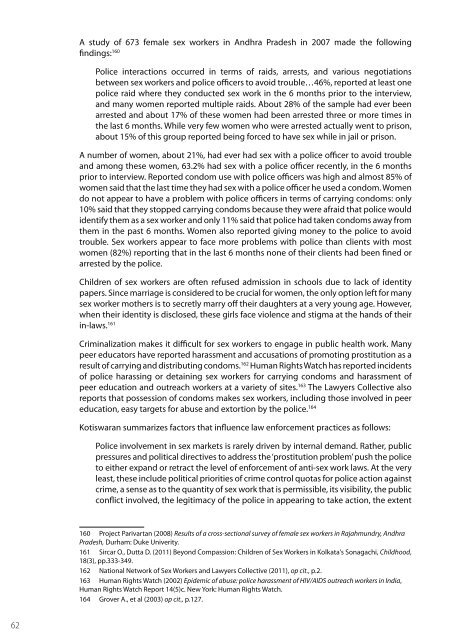SEX WORK AND THE LAW - HIV/AIDS Data Hub
SEX WORK AND THE LAW - HIV/AIDS Data Hub
SEX WORK AND THE LAW - HIV/AIDS Data Hub
Create successful ePaper yourself
Turn your PDF publications into a flip-book with our unique Google optimized e-Paper software.
A study of 673 female sex workers in Andhra Pradesh in 2007 made the following<br />
findings: 160<br />
Police interactions occurred in terms of raids, arrests, and various negotiations<br />
between sex workers and police officers to avoid trouble…46%, reported at least one<br />
police raid where they conducted sex work in the 6 months prior to the interview,<br />
and many women reported multiple raids. About 28% of the sample had ever been<br />
arrested and about 17% of these women had been arrested three or more times in<br />
the last 6 months. While very few women who were arrested actually went to prison,<br />
about 15% of this group reported being forced to have sex while in jail or prison.<br />
A number of women, about 21%, had ever had sex with a police officer to avoid trouble<br />
and among these women, 63.2% had sex with a police officer recently, in the 6 months<br />
prior to interview. Reported condom use with police officers was high and almost 85% of<br />
women said that the last time they had sex with a police officer he used a condom. Women<br />
do not appear to have a problem with police officers in terms of carrying condoms: only<br />
10% said that they stopped carrying condoms because they were afraid that police would<br />
identify them as a sex worker and only 11% said that police had taken condoms away from<br />
them in the past 6 months. Women also reported giving money to the police to avoid<br />
trouble. Sex workers appear to face more problems with police than clients with most<br />
women (82%) reporting that in the last 6 months none of their clients had been fined or<br />
arrested by the police.<br />
Children of sex workers are often refused admission in schools due to lack of identity<br />
papers. Since marriage is considered to be crucial for women, the only option left for many<br />
sex worker mothers is to secretly marry off their daughters at a very young age. However,<br />
when their identity is disclosed, these girls face violence and stigma at the hands of their<br />
in-laws. 161<br />
Criminalization makes it difficult for sex workers to engage in public health work. Many<br />
peer educators have reported harassment and accusations of promoting prostitution as a<br />
result of carrying and distributing condoms. 162 Human Rights Watch has reported incidents<br />
of police harassing or detaining sex workers for carrying condoms and harassment of<br />
peer education and outreach workers at a variety of sites. 163 The Lawyers Collective also<br />
reports that possession of condoms makes sex workers, including those involved in peer<br />
education, easy targets for abuse and extortion by the police. 164<br />
Kotiswaran summarizes factors that influence law enforcement practices as follows:<br />
Police involvement in sex markets is rarely driven by internal demand. Rather, public<br />
pressures and political directives to address the ‘prostitution problem’ push the police<br />
to either expand or retract the level of enforcement of anti-sex work laws. At the very<br />
least, these include political priorities of crime control quotas for police action against<br />
crime, a sense as to the quantity of sex work that is permissible, its visibility, the public<br />
conflict involved, the legitimacy of the police in appearing to take action, the extent<br />
160 Project Parivartan (2008) Results of a cross-sectional survey of female sex workers in Rajahmundry, Andhra<br />
Pradesh, Durham: Duke Univerity.<br />
161 Sircar O., Dutta D. (2011) Beyond Compassion: Children of Sex Workers in Kolkata's Sonagachi, Childhood,<br />
18(3), pp.333-349.<br />
162 National Network of Sex Workers and Lawyers Collective (2011), op cit., p.2.<br />
163 Human Rights Watch (2002) Epidemic of abuse: police harassment of <strong>HIV</strong>/<strong>AIDS</strong> outreach workers in India,<br />
Human Rights Watch Report 14(5)c. New York: Human Rights Watch.<br />
164 Grover A., et al (2003) op cit., p.127.<br />
62
















